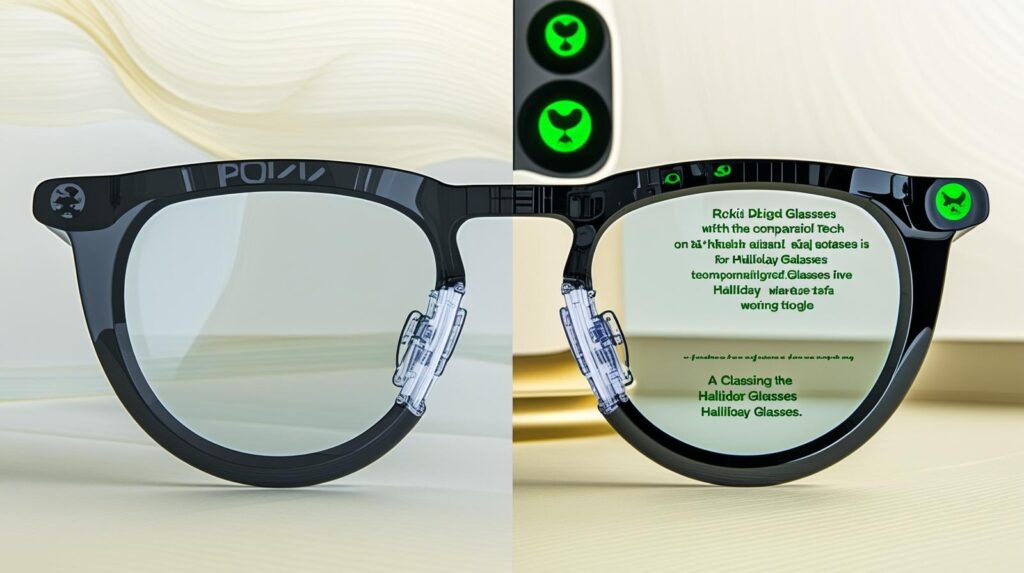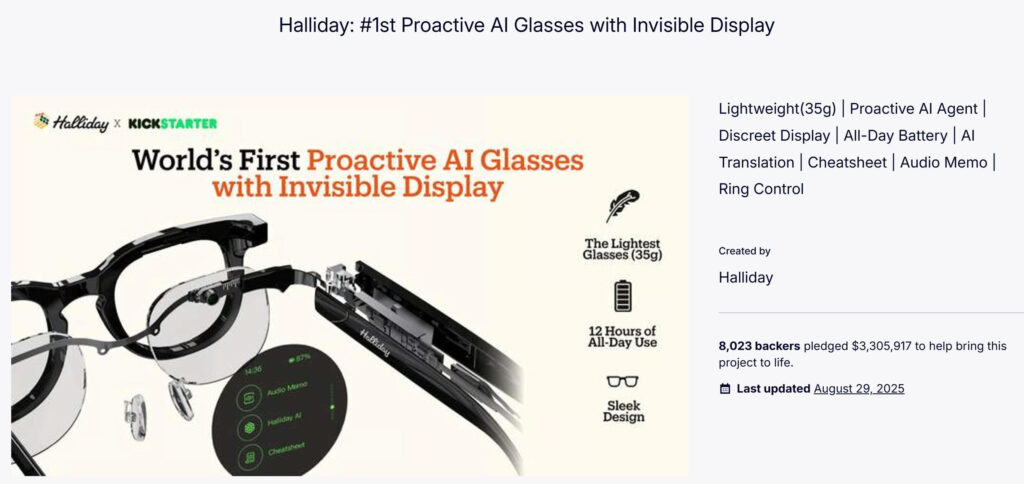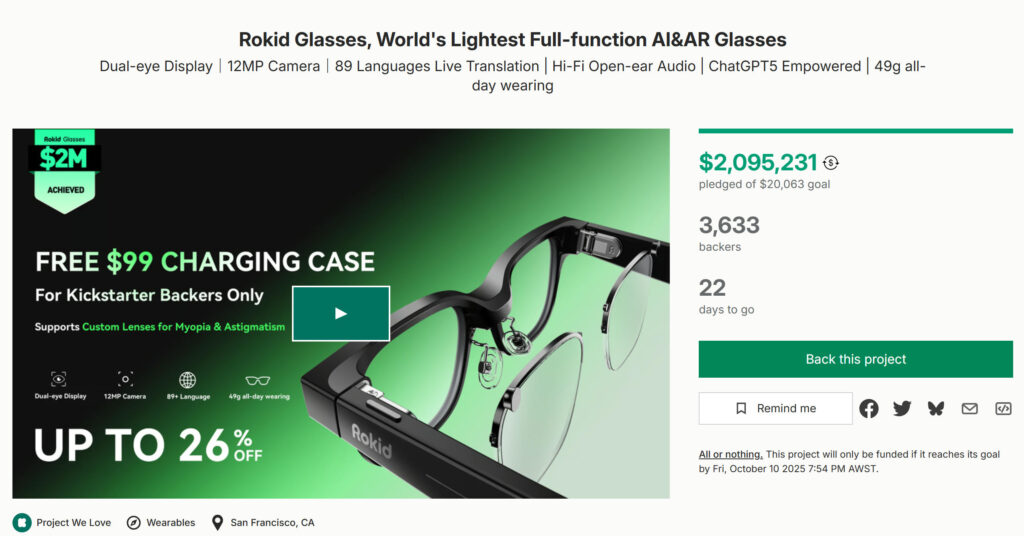Halliday vs. Rokid: Which Smart Glasses Kickstarter Should You Back?
AI smart glasses are heating up on Kickstarter, with two campaigns dominating attention: Halliday and Rokid. Both promise futuristic displays, real-time translation, and AI assistance. But backers don’t just care about features — they want to know whether the product will arrive on time, match the promises, and come with decent customer service.
Here’s a full comparison of how Halliday and Rokid differ in design, performance, and Kickstarter track record — to help you decide which one, if any, deserves your pledge.

Table of Contents
Product Comparison: Halliday vs Rokid

Halliday Glasses — the Minimalist Assistant
Design: Slim, lightweight (35 g), looks almost like normal glasses. The “DigiWindow” display sits in the upper-right corner of your vision.
Display: Tiny, monochrome green, about the size of a 3.5-inch floating screen. Best for short text, translations, and notifications.
Battery: Claimed up to 8 hours with moderate use.
Features: Real-time translations (40+ languages), proactive AI assistant, teleprompter mode, notifications.
Price: ~$399 early-bird on Kickstarter (expected retail ~$489).
Pros: Ultra-light, discreet, long battery, stylish.
Cons: Small, monochrome-only display; not for immersive AR.

Rokid Glasses — the Feature-Rich Challenger
Design: Slightly bulkier (49 g) with dual-eye waveguide displays.
Display: Dual MicroLED screens (480 × 398 per eye), 1,500 nits brightness — more immersive view.
Battery: Around 6 hours, shorter due to brighter display and extra hardware.
Features: AI assistant, subtitles, navigation overlays, live translation, 12 MP camera, speakers.
Price: ~$599 early-bird (MSRP higher).
Pros: Brighter, dual-eye displays, stronger hardware package.
Cons: Heavier, pricier, still monochrome green.
Side-by-Side at a Glance
| Feature | Halliday | Rokid |
|---|---|---|
| Weight | 35 g | 49 g |
| Display | Tiny “DigiWindow” corner screen | Dual MicroLED waveguides |
| Resolution | Small / text only | 480 × 398 per eye |
| Brightness | Adequate indoors | 1,500 nits, sunlight-readable |
| Battery | ~8 hrs | ~6 hrs |
| Price (Kickstarter) | ~$399 | ~$599 |
| Target User | Minimalist, discreet notifications | Power users, immersive overlays |
Kickstarter Reality Check
Rokid: Past Campaign Experience
Rokid has run multiple Kickstarter campaigns (AR Lite, Rokid Max/Station) and raised over $1M+.
They did deliver hardware, which builds credibility.
Delays were common, especially around software features (DRM, app compatibility). Some features shipped later or in a reduced form.
Updates are generally regular, but some backers call communication vague when plans change.
Verdict: Rokid usually delivers, but not always on time or with polished software.
Halliday: First Campaign, Early Results
Halliday raised $2M+ quickly — proving huge interest.
Some backers already received units and praise the glasses for being discreet, stylish, and comfortable, with the display working for translations and notifications.
But many are still waiting. Delays were caused by quality control problems (e.g., certain frame colors not matching promised finishes).
Communication is unusually transparent: Halliday posts detailed production updates explaining what failed QC and how they’re fixing it. Still, frustration is growing among those who expected April deliveries.
Verdict: A bold first campaign with promising design, but plagued by uneven delivery.
What Backers Are Saying
Direct comments from backers reveal the reality behind the campaigns:
Halliday
“I’m backer 1400. I’ve not received anything as yet. Any info would be great as you state you’ve sent out over 2000 units …” — Kickstarter comment
“Nearly 2,000 units have already been shipped for backers.” — Halliday project update
“Over the past few weeks, they’ve provided remarkably detailed feedback that has given us precise insights into real-world performance.” — Reddit backer
Rokid
“Last time with Rokid Max, the $10 package ended up being pointless … I feel very deceived by you.” — Kickstarter comment
“Comfortable and lightweight. They provide a greatly immersive experience … but my phone isn’t compatible.” — Trustpilot review
“Shipping was to be in September. Then they vanished for 10 days … and announced they were collecting shipping fees with no date.” — Trustpilot review
Takeaway: Halliday gets points for transparency but struggles with delivery; Rokid gets credit for delivering hardware, but trust has been dented by delays and unmet promises.
Which One Should You Back?
Choose Halliday if you value style, lightness, and subtle AI features. It’s great for travel, language support, and discreet use. Just expect delays and possibly rough edges in early units.
Choose Rokid if you want more immersive displays and stronger hardware, with a company that has actually shipped before. But be prepared for software hiccups and potential delivery slippage.
👉 The bottom line: both campaigns are worth watching, but remember — Kickstarter isn’t a store. Back if you’re excited to be part of the early wave of AI glasses, not if you expect a flawless consumer product on schedule.
